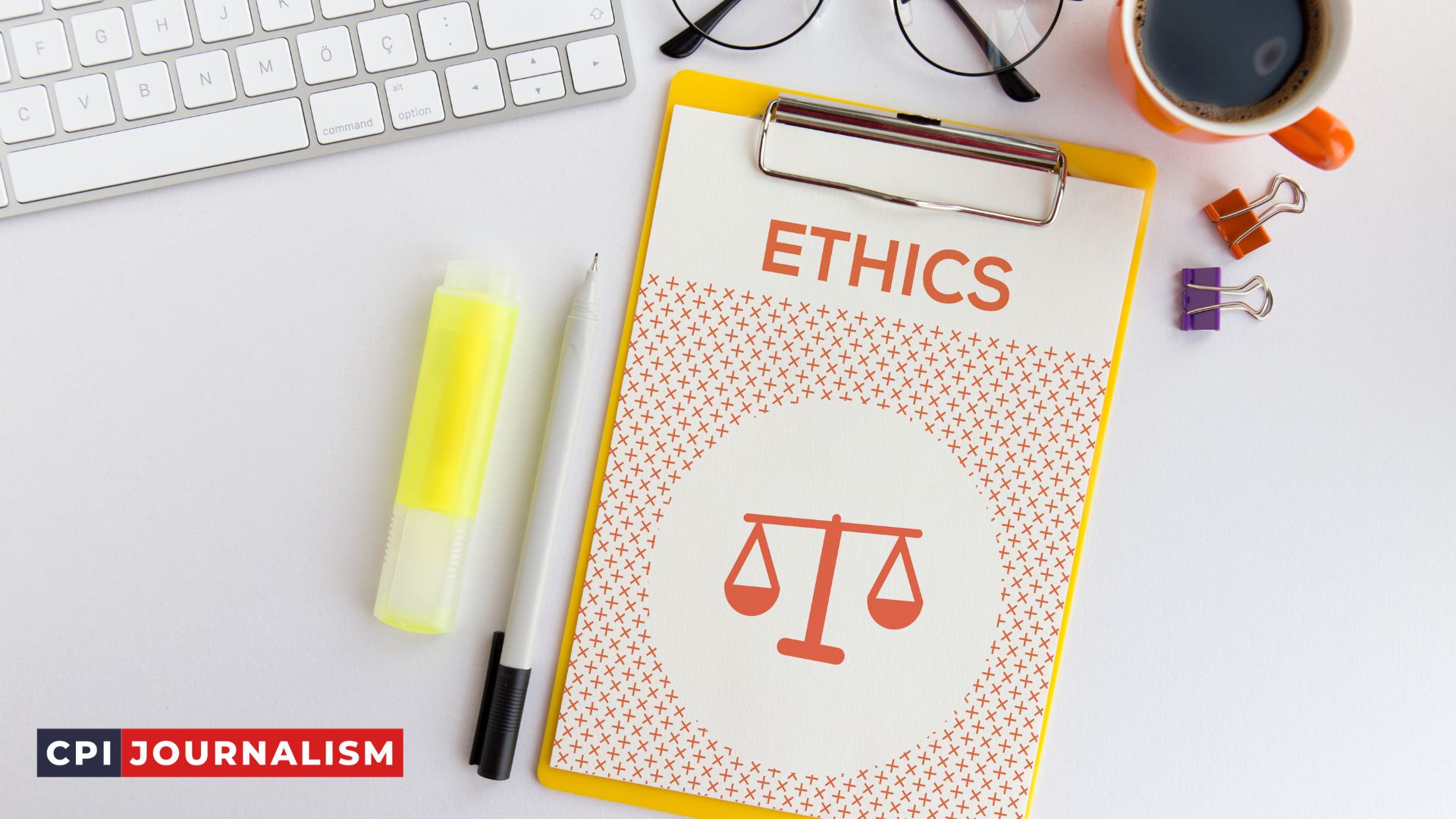What Ethical Considerations Do Broadcast Journalists Need To Keep In Mind When Reporting On Sensitive Or Controversial Issues?
As an experienced journalist, I am here to share my wisdom, experience, and expertise with upcoming journalists on the ethical considerations when reporting on sensitive or controversial issues.
As a journalist, it is our responsibility to ensure we are reporting the facts in an ethical and responsible manner.
We must be aware of our own biases, and we must also be aware of how our reporting can affect those involved and the public.
In this article, I will discuss the ethical considerations broadcast journalists must keep in mind when reporting on sensitive or controversial issues.
A. Definition of Sensitive and Controversial Issues
As a broadcast journalist, it is important to understand the difference between sensitive and controversial issues. Sensitive issues are those which are often considered to be delicate or delicate matters of a personal, social, political, or economic nature.
Controversial issues, on the other hand, are those which are subject to debate or disagreement due to differing opinions and perspectives.
When considering a sensitive or controversial issue for broadcast, it is important to understand the nuances and complexities of each topic, as well as the potential for harm or offense to an individual, group, or society.
Additionally, it is important to understand the potential for a reaction or backlash from a wide range of stakeholders, including members of the public, special interest groups, or other organizations.
It is also important to consider the potential for bias and objectivity when reporting on sensitive and controversial topics.
As a broadcast journalist, it is essential to maintain an appropriate level of neutrality and impartiality with respect to the subject matter in order to ensure the accuracy and validity of the reporting.
Finally, broadcast journalists need to be aware of the potential for censorship or restriction of content when reporting on sensitive and controversial issues.
In some cases, governments or other entities may impose regulations or restrictions on the broadcast of certain topics, which can have a significant impact on the ability of a journalist to accurately report on the issue.
B. Overview of Ethical Considerations for Broadcast Journalists
Broadcast journalists have a special responsibility to report on sensitive or controversial issues in a fair, accurate, and responsible manner. This means considering the ethical implications of their reporting and taking steps to ensure that their reporting is not misleading or exploitative in any way.
When reporting on sensitive or controversial issues, broadcast journalists must ensure that they are not taking advantage of vulnerable subjects or exploiting their stories for the purpose of sensationalizing their coverage.
Journalists should also be mindful of the potential impact of their reporting on the public and take steps to ensure that their coverage is not biased, incomplete, or inaccurate.
In addition, broadcast journalists must also ensure that they are not participating in any form of unethical practices, such as accepting bribes or gifts in exchange for favorable coverage.
Journalists should also be aware of any potential conflicts of interest that could arise from their reporting and take steps to address them.
Finally, broadcast journalists should be aware of any potential ethical dilemmas that could arise from their reporting and take steps to address them.
This could include discussing the ethical implications of their reporting with editors and other stakeholders, and considering the potential impact of their coverage on the public.
II. Ethical Considerations For Broadcast Journalists
Broadcast journalists have a unique responsibility to uphold ethical standards as they report on sensitive or controversial issues.
It is important for broadcast journalists to be aware of the ethical considerations they must keep in mind while covering these kinds of stories.
First and foremost, broadcast journalists must remember to always strive for balance and accuracy in their reporting. Broadcast journalists must make sure to present both sides of a story accurately, without skewing the facts to fit a particular agenda or narrative.
It is also important for broadcast journalists to be aware of the potential for bias in their reporting, and to ensure that their reporting is unbiased and fair in its presentation of facts.
It is also important for broadcast journalists to be aware of the potential for harm that their reporting may have on the individuals or groups they are covering.
Whenever possible, broadcast journalists should obtain the consent of any individuals or groups they are reporting on, and should strive to avoid causing any unnecessary harm to those they are covering.
Additionally, broadcast journalists should strive to remain objective and impartial when reporting on sensitive topics.
It is important for broadcast journalists to avoid using inflammatory language or making inflammatory statements, and to be aware of their own biases and preconceived notions that may influence their reporting.
Finally, broadcast journalists should strive to be aware of any potential conflicts of interest that may arise due to their reporting. It is important for broadcast journalists to make sure that their reporting is not influenced by any potential personal or financial interests.
By keeping these ethical considerations in mind, broadcast journalists can ensure that their reporting is accurate, balanced, and ethical.
A. Accuracy
As a broadcast journalist, accuracy is key when reporting on sensitive or controversial issues. When reporting on a sensitive or controversial issue, it is important to approach the topic with objectivity and fairness.
This means that all parties involved should be given equal opportunity to present their perspectives and facts should be checked and verified.
It is also important to remain impartial and unbiased when reporting on sensitive or controversial issues.
It is important to remain open-minded and not to allow personal opinions or values to influence reporting. It is also important to avoid sensationalizing the issue or making assumptions about the people involved.
It is also important to ensure that all facts presented are accurate and up to date. It is important to research the topic thoroughly and to double check facts and figures before presenting them to the public.
This is important to ensure that the public is receiving accurate information and to avoid any potential legal issues.
Finally, when reporting on sensitive or controversial issues, it is important to ensure that all sources are reliable and credible.
It is important to question sources and to verify information presented by them. It is also important to provide the public with multiple sources of information so they can make informed decisions.
1. Verifying Sources
As an ethical broadcast journalist, it is essential to ensure that any sources cited during a report are accurate and reliable. This is especially important when reporting on controversial or sensitive issues, as the credibility of the story is dependent upon the credibility of the sources.
When verifying the sources for a story, it is important to assess the accuracy of the source’s information. If the source is an individual, it is important to determine their knowledge and expertise on the subject.
If the source is a document, it is important to examine the document for accuracy and authenticity.
Additionally, it is important to consider the potential bias of the source. All sources have their own agenda and it is important to be aware of potential sources of bias.
This can include considering whether the source has any affiliations with groups or organizations that may be promoting their own particular agenda.
Finally, it is important to consider the potential consequences of using a particular source. For example, when reporting on a controversial issue, it may be important to consider the potential backlash of using a particular source or citing certain information.
In summary, verifying sources is an essential part of ethical broadcast journalism. It is important to assess the accuracy, credibility, and potential bias of a source, as well as to consider the potential consequences of citing a particular source.
By doing so, broadcast journalists can ensure that the stories they are reporting are accurate and reliable.
2. Avoiding Bias
As a broadcast journalist, it is important to be aware of potential biases that may be present in reporting on sensitive or controversial issues.
Bias can occur when a journalist has a preconceived opinion or perspective on a particular issue. It is essential to remain impartial and objective when reporting on such topics.
The first step in avoiding bias is to be aware of any potential prejudices or preconceived notions that you may have. It is also important to research the subject thoroughly, so that you can be informed on all perspectives and views.
It is important to be open to different points of view and to be willing to listen to all sides of an argument.
It is also important to be aware of any personal connections or relationships that may exist between you and any of the people or organizations involved in the issue that you are covering. If necessary, it may be best to recuse yourself from covering the story.
Finally, it is essential to double-check all facts and sources. This will help to ensure that you are not inadvertently introducing bias into your reporting. The goal should be to present an unbiased, accurate report on the issue.
By being aware of potential biases and taking steps to avoid them, a broadcast journalist can ensure that they are reporting on sensitive or controversial issues in an ethical manner.
3. Double-Checking Facts
As a broadcast journalist, when reporting on sensitive or controversial issues, it is essential to double-check facts. Never rely on a single source of information. Make sure to confirm facts from multiple sources, including primary sources whenever possible.
Additionally, be sure to read the fine print and pay attention to details, which can easily be overlooked. It is also important to fact-check any quotes used in a story and make sure to provide full context for the quote.
When double-checking facts, it is also important to consider the potential biases of the sources. Evaluate the credibility of sources by examining their track record and noting any potential conflicts of interest.
It is also important to consider the potential for spin and manipulation, as this can significantly influence the accuracy of the story.
Finally, always remember that reporting on sensitive or controversial issues can have serious consequences.
It is essential to be mindful of the potential impact of the story on the lives of those involved. In order to ensure accuracy, double-check facts before reporting and never rely on a single source of information.
B. Fairness
Fairness is one of the most important ethical considerations for broadcast journalists when reporting on sensitive or controversial issues. It is the responsibility of the journalist to present all sides of the story in an unbiased, objective manner.
This means that journalists should strive to remain neutral and not take sides, regardless of their personal opinion or beliefs.
When reporting on a sensitive or controversial issue, a broadcast journalist should aim to present a balanced view of the story.
This means they should give each side of the story equal weight and attention. Journalists should also strive to be accurate and include a variety of sources in their reporting. This will help to ensure that the story is presented in a fair and unbiased way.
In addition to presenting a balanced view of the story, it is important for journalists to ensure that their reporting is not misrepresenting any of the facts.
Journalists should be careful not to present any information that is inaccurate or misleading. They should also be wary of any sources that may be providing biased or one-sided information.
Finally, journalists should always strive to be respectful and sensitive when reporting on a sensitive or controversial issue.
They should be aware of the potential impact their words and reporting may have on the people involved in the story and take care to avoid any language or imagery that could be considered offensive or inappropriate.
By adhering to these guidelines, broadcast journalists can ensure that their reporting is fair, unbiased and respectful.
1. Representing All Sides of the Story
When reporting on sensitive or controversial issues, one of the most important ethical considerations for broadcast journalists is to represent all sides of the story.
This means that the journalist must ensure that their reporting is balanced and fair, and that all relevant points of view are accurately presented.
It is important to understand that all sides of a story will not necessarily agree, but it is the journalist’s responsibility to present all perspectives in a fair and unbiased way.
To ensure that all sides of the story are represented, a broadcast journalist should take care to research the issue thoroughly and seek out a variety of sources for information.
This includes speaking to experts and those with direct knowledge of the subject, as well as consulting a range of primary and secondary sources. It is also important to interview those who may have opposing views to ensure that the story is balanced.
Additionally, it is important to be aware of any potential biases that may exist in the reporting. This includes a personal bias, as well as any potential bias in the sources used. By being aware of these potential biases, broadcast journalists can ensure that they are presenting an accurate and unbiased representation of the facts.
Finally, broadcast journalists need to be aware of any potential legal issues that may arise from their reporting.
This includes understanding the laws related to defamation, libel, and copyright, as well as any local or national regulations that may apply. By understanding these issues, journalists can ensure that their reporting is compliant with all relevant laws and regulations.
2. Not Sensationalizing
When reporting on sensitive or controversial issues, broadcast journalists need to be especially mindful of not sensationalizing the story. Sensationalizing a story means overstating the facts or adding additional details that are not based in the truth.
This can be done through the use of exaggerated language, selective editing, or other techniques. Sensationalizing a story can lead to inaccurate reporting and distort the truth.
It is the responsibility of the journalist to ensure that the facts are accurately presented. Any information that is shared should be verified and double-checked to ensure its accuracy. If there is any doubt about the validity of the information, it should not be reported.
Additionally, it is important for broadcast journalists to focus on the facts of the story rather than opinion or speculation. If an opinion is to be shared, it should be clearly stated as such and should be attributed to the appropriate source. Speculation can lead to misinforming the public and should be avoided.
Finally, broadcast journalists should also be aware of their own biases and how these could influence their reporting.
Being conscious of one’s biases can help ensure that the story is being reported in an unbiased manner. It is the journalist’s responsibility to present a story in an unbiased and factual way that allows the public to draw their own conclusions.
3. Not Manipulating The Audience
One of the most important ethical considerations for broadcast journalists when reporting on sensitive or controversial issues is to avoid manipulating the audience.
In today’s world of “fake news,” it is more important than ever for journalists to stay ethical and present unbiased stories to the public.
Journalists must remember that their job is to report the facts and tell the stories of those affected by the issues, not to persuade viewers to take a particular point of view.
It is important to remember that while journalists may have their own opinions on the issue, they should never try to influence the audience by presenting their own opinion as fact or by omitting or slanting the facts.
When reporting on sensitive or controversial issues, journalists must always strive to present the facts in a fair and impartial manner.
It is also important for journalists to be aware of the potential for their stories to be misinterpreted or misconstrued by the public. To avoid this, journalists should always strive to present the facts in a clear and concise way that is accessible to a wide audience.
Additionally, journalists should provide adequate context and background information to help viewers understand the issue.
Finally, it is important for journalists to maintain a level of objectivity in their reporting. While it is important to tell the stories of those affected, journalists must strive to remain impartial and not take sides in the story.
This will help to ensure that the audience is presented with a balanced view of the issue and that their opinions are not shaped by the journalist’s personal biases.
C. Respect
When it comes to the audience, broadcast journalists must be aware of the impact their stories can have. It is important to be mindful of the audience’s cultural, political, and religious backgrounds and how their beliefs may be affected by the story.
Broadcast journalists should always strive to be balanced, fair, and accurate when reporting on sensitive or controversial issues.
When it comes to sources, broadcast journalists must always ensure that they are reporting from reliable sources. It is important to double-check sources and make sure that the information being reported is accurate. Additionally, broadcast journalists should never use unnamed sources or publish false information.
Finally, when it comes to the topic of the story, broadcast journalists should take care to ensure that the story is presented in a respectful manner.
Sensitive topics should be handled with care and respect for the people involved in the story. Respect for the subject matter, regardless of the journalist’s personal opinion, should be a top priority.
The key to reporting on sensitive and controversial topics is to always maintain respect for the audience, the sources, and the topic of the story. By doing so, broadcast journalists can ensure that their reporting is ethical and responsible.
1. Not Exploiting Vulnerable People
As a broadcast journalist, it is essential to remember that reporting on sensitive or controversial issues can have a huge impact on vulnerable people. As such, it is important to ensure that all reporting is conducted in an ethical manner and that vulnerable people are not exploited.
Firstly, it is essential to ensure that the voices of vulnerable people are heard in a dignified and respectful manner.
This means that any interviews should be conducted in a professional, non-judgmental way, and with the utmost respect for the person’s privacy. The subject should also be given the opportunity to decide when and how their information is shared.
Secondly, it is essential to ensure that vulnerable people are not manipulated or exploited in any way. This means that the journalist should not use any manipulative tactics or language to try to persuade the subject to share information.
Additionally, it is important to ensure that the subject is not encouraged to share information that they are not comfortable with or do not want to share.
Finally, it is important to ensure that vulnerable people are not exploited for their story or used as a way to get ratings or attention. This means that the journalist should not sensationalize a story to the point that it harms vulnerable people, or use it as a way to boost ratings or get more attention.
Overall, it is essential for broadcast journalists to remember that reporting on sensitive or controversial issues can have a huge impact on vulnerable people. As such, it is important to ensure that all reporting is conducted in an ethical manner and that vulnerable people are not exploited.
2. Not Invading Privacy
One of the most important ethical considerations for broadcast journalists when reporting on sensitive or controversial issues is not invading anyone’s privacy.
Journalists must be conscious of their responsibility to protect the individual rights of those they are interviewing or reporting on, as well as of the public’s expectation that there be some limits to what the media can report.
This includes protecting the right to privacy of those not directly involved in the controversy, but whose lives may be intersected by it.
Since the advent of digital media, the right to privacy has become even more crucial, as many of us live our lives increasingly in the public eye.
As such, broadcast journalists must be aware of the implications of reporting on an individual’s personal life or information. Wherever possible, they should seek consent from those involved, and be prepared to respect their wishes if they decline to be interviewed or featured in any way.
Furthermore, broadcast journalists should be aware of the risks posed by their reporting. They should take extra care to verify the accuracy of their reports and be mindful of defamation laws when making any accusations or criticisms.
This is particularly important in reporting on controversial issues, as even well-intentioned reports can lead to legal action being taken against the journalist or news organisation.
In summary, broadcast journalists should take extra care to protect the privacy of those they are reporting on, and be mindful of the potential legal risks of their reporting. By doing so, they can ensure that their reports are both ethical and accurate.
3. Not Using Offensive Language
It is essential for broadcast journalists to be aware of the language they use when reporting on sensitive and controversial issues. The language used by a journalist should be professional, respectful, and appropriate for the topic being covered.
It is important for broadcast journalists to remain mindful of the fact that some words may have a different meaning in different contexts, and may be offensive to some people.
Broadcast journalists also need to be aware that certain words may have a negative connotation, and should be avoided when possible.
For instance, words like “illegal”, “terrorist”, and “criminal” may have a negative connotation and should be avoided unless absolutely necessary. Instead, journalists should strive to use neutral language that does not imply guilt or innocence.
It is also important for broadcast journalists to be aware of the potential for language to be misinterpreted or taken out of context.
For example, if a journalist is discussing a controversial issue and uses colloquial language, it could be interpreted as taking a side in the issue. Therefore, broadcast journalists should strive to use language that is clear and concise, and avoid any language that could be perceived as inflammatory.
In conclusion, broadcast journalists should be mindful of the language they use when reporting on sensitive and controversial issues.
They should strive to use neutral language that does not imply guilt or innocence, and avoid any language that could be interpreted as taking a side or as being inflammatory.
By doing so, broadcast journalists can maintain their ethical standards and ensure that their reporting is fair and unbiased.
D. Objectivity
Objectivity is an important ethical consideration for broadcast journalists when reporting on sensitive or controversial issues. As a broadcast journalist, it is essential to maintain a level of objectivity and impartiality in reporting.
This means that the journalist must avoid any personal bias or opinion and should strive to present the facts and relevant information objectively.
In order to maintain objectivity, broadcast journalists should strive to provide a balanced view of the issue, which presents both sides of the argument in an unbiased manner.
In addition, it is important for broadcast journalists to avoid sensationalizing or overstating the facts when reporting on sensitive or controversial issues.
It is important to maintain accuracy and truthfulness in reporting, and to avoid misrepresenting any facts or making false claims. This is especially important in cases of public interest, as such reports can have a significant impact on public opinion.
Finally, broadcast journalists should always strive to be respectful when reporting on sensitive or controversial issues.
Respect for the issue being reported on and the people involved is essential for ethical reporting, and broadcast journalists should always be mindful of this when reporting on sensitive or controversial topics.
1. Not Taking Sides
As a broadcast journalist, it is essential to maintain a neutral stance when reporting on sensitive or controversial issues.
This means not taking sides, regardless of the personal opinions of the journalist. It is the journalist’s responsibility to provide viewers with an unbiased narrative of the facts, rather than trying to sway opinion one way or another.
One of the most important ethical considerations when reporting on a sensitive or controversial issue is to ensure that all sides of the story are represented and impartiality is upheld.
This means presenting the facts objectively and fairly, and not taking part in advocacy journalism or presenting a skewed narrative.
It is also important to not sensationalize the issue or report on inaccurate information. When reporting on a sensitive or controversial issue, journalists should avoid using inflammatory language or making value judgments, as this can lead to viewer bias.
To maintain a neutral stance, it is essential for broadcast journalists to have a comprehensive understanding of the issue.
This means doing thorough research and fact-checking to ensure accuracy in reporting. It is also important to include multiple sources and voices in the story, and to ensure that all sources are reliable and credible.
By taking the time to research and understand the issue, journalists can ensure that they are providing an unbiased and accurate narrative.
2. Not Making Assumptions
It is important for broadcast journalists to ensure that they are not making assumptions when reporting on sensitive or controversial issues.
Journalists must strive to remain objective and refrain from making assumptions based on preconceived notions or personal opinion. This can be difficult to do, especially when a journalist is passionate about a particular issue, but it is essential to ensure that the reporting remains ethical.
Journalists must be mindful of the facts that they are reporting and make sure that they are representing all sides of the story in a fair and balanced manner.
It is important to be aware of the potential biases that may be present in the story, and to take the necessary steps to minimize them. This can involve speaking with experts and researching thoroughly to ensure that the story is as accurate and unbiased as possible.
Journalists must also be careful to not jump to conclusions or make assumptions about their sources. It is important to be respectful and considerate of the people involved in the story, and to ensure that their comments and opinions are accurately represented.
It is also important to remember that everyone has the right to privacy and to not publish anything that could be damaging or hurtful to someone’s reputation.
By taking the necessary steps to avoid making assumptions, broadcast journalists can ensure that their reporting is ethical and responsible. This will help to ensure that their stories are accurate and unbiased, and will help to build trust with their audience.
3. Not Presenting Opinion as Fact
One of the primary ethical considerations that broadcast journalists need to keep in mind when reporting on sensitive or controversial issues is to ensure that they are not presenting opinion as fact.
In other words, it is important for broadcasters to be aware of the potential for bias or prejudice in their reporting and to take steps to ensure that their reporting is factual and objective.
Broadcasters should make every effort to remain impartial and unbiased in their reporting. This means being aware of their own personal biases and avoiding making assumptions or drawing conclusions based on those biases.
It is also important to avoid making sweeping generalizations or statements of opinion as these can be seen as biased or prejudicial.
In addition, broadcasters should make sure that they are presenting both sides of the story. While it may be tempting to focus on one side or the other, it is important to ensure that viewers and listeners are given the opportunity to hear all perspectives.
This can be done by giving each side of the story equal time or by ensuring that each side is represented fairly and accurately in the reporting.
Finally, broadcasters should ensure that they are being honest and transparent in their reporting. This means making sure that any sources or information that are used in reporting are accurately attributed and that any conflicts of interest are clearly disclosed.
This can help to ensure that broadcasters are not presenting opinion as fact and that viewers and listeners are provided with accurate and balanced information.
III. Challenges Of Reporting On Sensitive And Controversial Issues
As a broadcast journalist, reporting on sensitive or controversial issues can be a difficult but important task. It is important to remember the ethical considerations that a journalist must keep in mind when reporting on such topics.
Here are some of the common challenges of reporting on sensitive and controversial issues:
1) Objectivity: One of the key challenges of reporting on sensitive and controversial issues is maintaining a sense of objectivity. Journalists must take care to ensure that their reporting is balanced and impartial, and that they are not presenting a biased viewpoint.
It is important to remember that the goal is to provide an accurate and unbiased account of the issue, so that viewers can make up their own minds.
2) Clarity: It is also important to ensure that the reporting is clear and concise. When dealing with sensitive and controversial topics, it is easy to become overwhelmed with information and to lose sight of the main points.
Therefore, it is important to ensure that the reporting is structured in a way that makes it easy for viewers to understand.
3) Sensitivity: Finally, it is also important to remember to exercise sensitivity when reporting on sensitive and controversial topics. People are often very passionate about these issues, and it is important to remember to remain respectful and not to incite further controversy or hostility.
It is also important to remember to be mindful of anyone that may be affected by the reporting and to ensure that they are not exposed to unnecessary distress or harm.
These are just a few of the challenges associated with reporting on sensitive and controversial issues. With careful consideration and attention to detail, broadcast journalists can ensure that their reporting is ethical and responsible.
A. Balancing Accuracy and Fairness
As a broadcast journalist, it is important to maintain a balance between accuracy and fairness when reporting on sensitive or controversial issues. Accuracy is the foundation of journalism and must always be the top priority.
Journalists must ensure that their reporting is fact-based and accurate to protect the integrity of their profession and to ensure trustworthiness within the public.
However, in addition to accuracy, fairness is also a key consideration. It is important to remember that when reporting on sensitive or controversial issues, the stories must be told in an unbiased and non-judgmental manner. Every story has multiple sides, and it is the journalist’s job to present all sides in an impartial way.
To maintain a balance between accuracy and fairness, broadcast journalists must be diligent in their research. Journalists must seek out a variety of sources, including primary sources, and get both sides of the story.
Additionally, it is important to use language that is both accurate and respectful. A journalist should avoid using inflammatory language or making assumptions.
Ultimately, the goal of any journalist should be to report the facts in a responsible, impartial, and unbiased manner. Achieving this balance between accuracy and fairness can help ensure that the public is kept informed without bias.
B. Dealing With Pressure From Stakeholders
As a broadcast journalist reporting on sensitive or controversial issues, it is important to be aware of potential pressure from stakeholders.
These stakeholders can range from political or corporate entities to special interest groups, and they may attempt to influence the content of your reporting. As a journalist, it is important to remain impartial and to report the facts, regardless of any pressure from these stakeholders.
The first step in dealing with pressure from stakeholders is to recognize it. If you are approached by anyone attempting to influence the content of your reporting, it is important to recognize that this is an instance of attempted stakeholder pressure and to remain vigilant.
The second step is to remain firm in your commitment to reporting the facts. Stakeholders may attempt to influence the content of your reporting in order to serve their own interests, and it is important to remain impartial and to report the facts without letting personal or political interests interfere.
The third step is to document any attempts to influence your reporting. If you are approached by a stakeholder, it is important to document the conversation and to keep a record of any attempts to influence the content of your reporting.
This can help protect you from any potential legal repercussions if the stakeholder attempts to alter your reporting in some way.
Finally, it is important to remain independent and to maintain the integrity of your reporting. As a broadcast journalist, it is important to remember that you are responsible for reporting the facts and that any attempts to influence the content of your reporting should be resisted.
C. Navigating Ethical Dilemmas
As a broadcast journalist reporting on sensitive or controversial issues, it can often feel like navigating a minefield.
It is essential to have a thorough understanding of the ethical considerations to ensure that you adhere to the highest standards of reporting and avoid any potential pitfalls.
One of the primary ethical considerations is to ensure that your reporting is accurate and balanced. This means verifying facts and cross-checking sources, while ensuring that all sides of the story are represented in your coverage.
It is important to remain impartial and to avoid sensationalizing the story, as this can lead to ethical lapses.
Additionally, when reporting on sensitive topics, it is important to be mindful of the potential impact of your reporting on the people involved. It is essential to consider the implications of your coverage and to ensure that the people in your story are treated with respect and sensitivity.
Finally, it is essential to be aware of potential conflicts of interest and to ensure that your reporting is free from bias or prejudice. It is important to avoid any potential conflicts of interest and to be transparent about any sources of funding or support.
Navigating ethical dilemmas while reporting on sensitive or controversial issues can certainly be challenging, but with a thorough understanding of the ethical considerations, you can ensure that your reporting meets the highest standards of integrity.
IV. Conclusion
When reporting on sensitive or controversial issues, broadcast journalists need to be mindful of their ethical considerations in order to ensure that their reporting is accurate, fair, and balanced.
By understanding the legal implications of their reporting, researching their stories thoroughly, and considering the implications of their stories, broadcast journalists can ensure they are presenting their stories in a responsible manner.
Moreover, it is important for broadcast journalists to remember that their reporting can have a lasting impact on those involved in the story, so they must always strive to maintain the highest ethical standards.
Ultimately, by adhering to these ethical considerations, broadcast journalists can ensure that their reporting is both accurate and responsible.
A. Summary Of Ethical Considerations For Broadcast Journalists
Broadcast journalists need to adhere to a strict set of ethical considerations when reporting on sensitive and controversial topics.
Firstly, journalists must ensure that their report is accurate and truthful. All facts, figures, and opinions should be verified and backed up with reliable sources.
All sides of the story should be represented in a balanced and fair manner with no bias towards one opinion over another. It’s also important to give all parties an opportunity to respond to any allegations made in the report.
Secondly, journalists should be aware of the potential for their report to cause emotional distress or harm to any of the parties involved in the story.
This includes those interviewed, victims or their families, or anyone whose privacy or reputations may be affected. Journalists should take particular care when reporting on vulnerable individuals, such as children or the elderly.
Thirdly, broadcast journalists need to be aware of their own personal biases and how they may affect their report. It’s important to remain objective and impartial while reporting on sensitive and controversial topics, regardless of any personal views or opinions.
In summary, broadcast journalists should strive to maintain accuracy, fairness, and objectivity when reporting on sensitive and controversial issues.
They should also be aware of the potential for their report to cause distress or harm to those involved in the story. Lastly, they should take care to remain unbiased and impartial when reporting on such topics.
B. Importance of Ethical Reporting
As a broadcast journalist, it is important to remember that ethical reporting is essential when discussing sensitive or controversial issues.
Ethical reporting is the practice of producing news stories in an unbiased, accurate, and responsible manner, while avoiding any form of manipulation or distortion of the facts.
This type of reporting is essential in order to protect the integrity of the news source, as well as to ensure that the public is provided with accurate information.
Ethical reporting is also necessary in order to ensure that the viewers and readers of the news are provided with a fair and balanced view of the subject matter.
It is important for journalists to ensure that all aspects of a story are reported objectively, without any personal bias or opinion. This includes avoiding any speculation or conjecture when reporting on a story, as well as refraining from sensationalizing or exaggerating the facts.
In addition, ethical reporting is essential in order to protect the reputation and credibility of the journalist and news organization. Producing news stories that are accurate and unbiased will help to maintain a positive image for both the journalist and the news source.
It is also important to remember that ethical reporting is an essential part of the journalist’s job, and it is expected that journalists will adhere to the highest standards of journalistic integrity.
C. Call To Action For Broadcast Journalists
Broadcast journalists must remember that reporting on sensitive or controversial issues requires a higher level of ethical consideration than reporting on everyday news. As such, the call to action for broadcast journalists is to ensure that their reporting is accurate, fair, and balanced.
First and foremost, broadcast journalists must commit to providing accurate information. It is essential that they double-check their sources, fact-check their stories, and ensure that the information they present is reliable.
In addition to accuracy, broadcast journalists must also strive for fairness and balance in their reporting. This means that they should strive to present all sides of the story, and ensure that their reporting is not biased in any way.
Furthermore, broadcast journalists should not sensationalize the story, or inject their own opinion into the reporting.
Finally, broadcast journalists should take special care to protect the privacy of the individuals involved in the story, and respect their rights. They should not share confidential information, or put anyone at risk.
By following these ethical guidelines, broadcast journalists can ensure that their reporting is both fair and accurate. They will also be helping to ensure public trust in the media, and the integrity of the profession.







